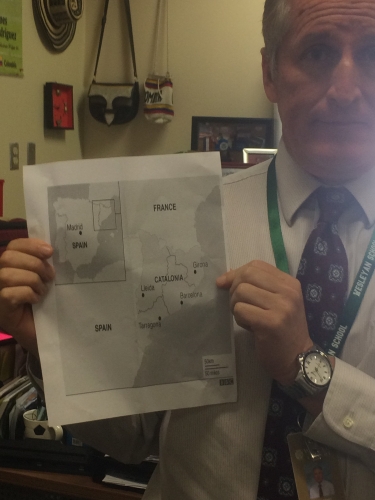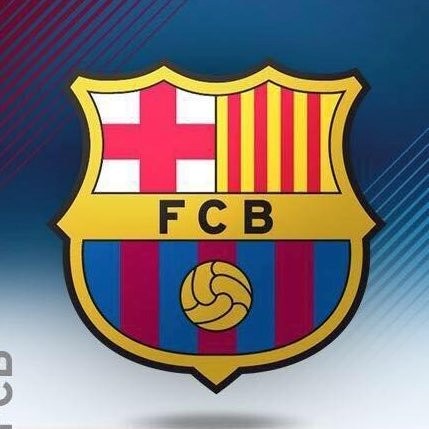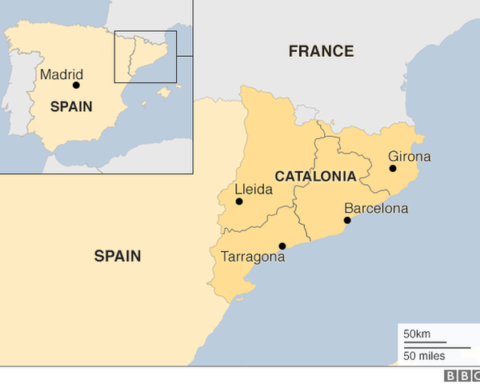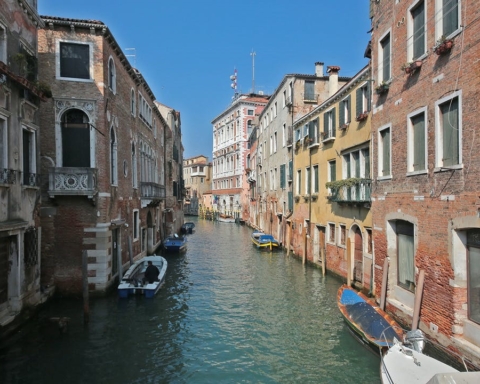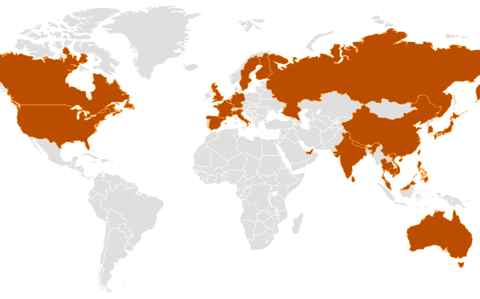Whether it be through soccer, economics or relations between the people, the Catalonian Secession is having a profound impact on the country of Spain. The Catalonians are demanding independence from Spain and will settle for nothing less than complete secession from their mother country.
Catalonia is a region of Spain that runs itself autonomously with their own government called the Generalitat de Catalunya. Catalonians have never really considered themselves to be a part of Spain. For many years, Catalonia and Spain were separate countries, but in 1714, the Spanish defeated Catalonia in the War of the Spanish Succession, which resulted in modern-day Spain. When democracy regained power after General Francisco Franco, Catalonia was granted some autonomy in 1977.
Although Catalonia had been and was still a part of Spain for over 250 years, it is largely independent with its own culture and language. Ever since the Constitutional Court in Madrid overruled part of the 2006 Autonomy Statute, subsequently stating that there is no legal basis for recognizing Catalonia as a nation within Spain, there have been increasing amount of calls for complete independence from Spain.
Economics have also played a huge role in inciting the population of Catalonia to support splitting from Spain. AP European history teacher Knoxie Roche said, “The long-term impact of secession would be primarily economic.”Catalonia is one of the richest and most industrialized regions of the country with a heavy emphasis on manufacturing. Catalonia accounts for about 19 percent of Spain’s total gross domestic product. Additionally, Catalonia is the industrial heartland of Spain and specializes in the trade of goods such as textiles, finances, services and high-tech companies.
Catalonia also believes that that they receive an unfair redistribution of tax revenues from Madrid. Every year Catalonia pays around 10 billion euros more in taxes to Madrid than it gets back. Many Catalonians feel like they are being cheated out of their rightful money. To further illustrate this fact, Andalusia, Spain’s poorest region, receives almost 10 billion euros more than it pays to Madrid. All of these reasons add up to the current mindset in Catalonia: that the people have given more to Spain, a country they do not feel any allegiance to, than they have gotten back, and that they would be better off on their own.
A Catalonian secession could possibly be catastrophic for Spain, and as of now the Spanish government is doing anything they can to prevent the secession from occurring. So far, the Spanish government has imprisoned eight Catalonian ministers who were involved with Catalonia’s recent declaration of independence. In addition to this imprisonment of Catalonian politicians, the Spanish government deployed police in riot gear to prevent the people of Catalonia from voting for their independence. This incident ended in hundreds of Spanish civilians being injured and the Spanish police failing to prevent the referendum from happening. There are many reasons that Spain does not want Catalonia to gain independence. Not only would they lose a big part of their economy, 20 percent of their GDP and around 16 percent of their population, but it would also affect additional issues such as sports and culture.
Spain has always been historically known for their well-regarded soccer teams and players. With Catalonia seceding, the Spanish National Team will lose key players and consequently would affect the whole soccer program in Spain. Wesleyan junior Harrison Larner said, “It would be like Americans not being able to draft football players from California or Texas.” As well as the National Team being at a detriment, there are many speculations that the the biggest soccer league in Spain, La Liga, might be forced to split in two. There are many teams in Catalonia that take part in this league, but the most known team that has an intense rivalry with Real Madrid is FC Barcelona. With the Catalonian secession, FC Barcelona and all of the other teams that are based in Catalonia will not be able to play in this Spanish league and would instead have to create their own soccer league for their teams.
Although sports may seem like a trivial and insignificant detail to outsiders looking in on this big event, it is very important to many Spaniards and Catalonians. Soccer has been both a uniting factor and dividing factor for the country of Spain. When the World Cup comes along, everyone bands together against the other countries, but when it is regular soccer season, everyone supports their own region, not the country of Spain. Spanish resident Margot Flores, great-aunt of the author, said, “There are many rivalries that exist within Spain. The Catalonian secession will only make these rivalries even more intense, and these rivalries will manifest themselves in soccer.”
Almost all of the Spanish are against Catalonian secession, but there are some that watch and are curious to see what will come out of this. Catalonia is not the only region of Spain that has its own language and culture. One example is the Basque region of Spain. The Basque region is very similar to Catalonia in many ways. They have their own language, culture and autonomously run their own region. Depending on the position of the government and what happens with this secession of Catalonia, there may be another region of Spain seceding not too long after the Catalonian secession runs its course.

